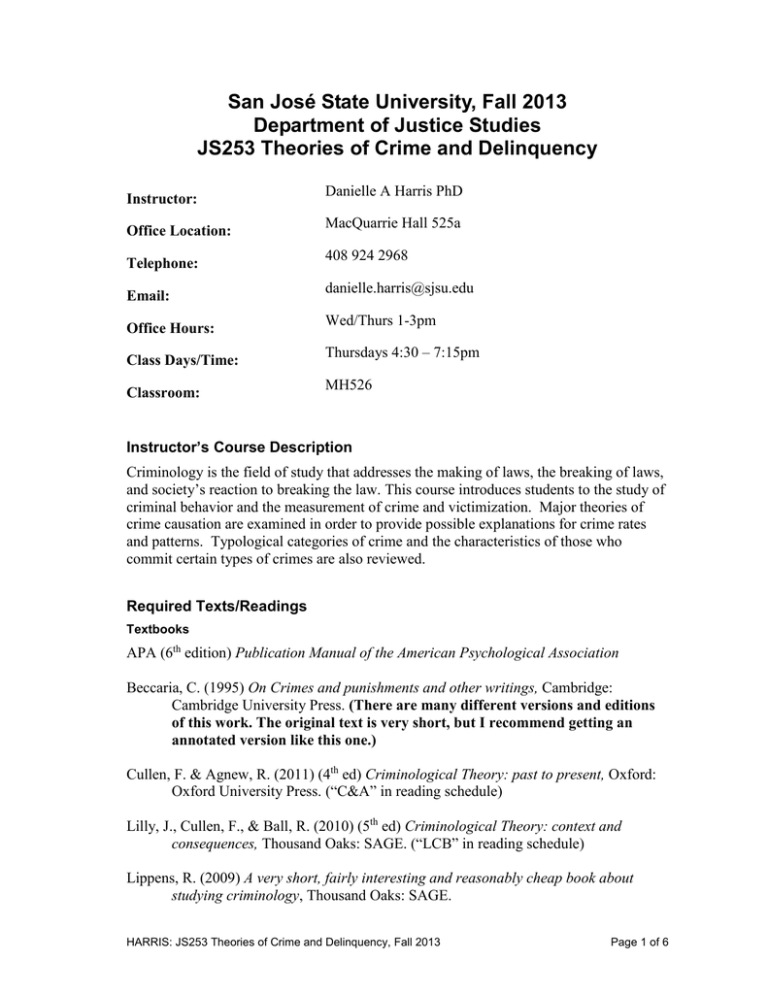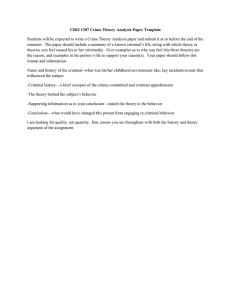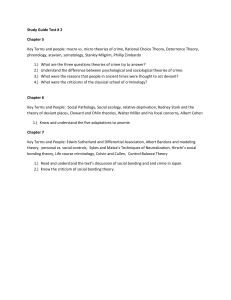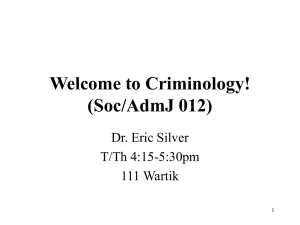San José State University, Fall 2013 Department of Justice Studies
advertisement

San José State University, Fall 2013 Department of Justice Studies JS253 Theories of Crime and Delinquency Instructor: Office Location: Telephone: Email: Office Hours: Class Days/Time: Classroom: Danielle A Harris PhD MacQuarrie Hall 525a 408 924 2968 danielle.harris@sjsu.edu Wed/Thurs 1-3pm Thursdays 4:30 – 7:15pm MH526 Instructor’s Course Description Criminology is the field of study that addresses the making of laws, the breaking of laws, and society’s reaction to breaking the law. This course introduces students to the study of criminal behavior and the measurement of crime and victimization. Major theories of crime causation are examined in order to provide possible explanations for crime rates and patterns. Typological categories of crime and the characteristics of those who commit certain types of crimes are also reviewed. Required Texts/Readings Textbooks APA (6th edition) Publication Manual of the American Psychological Association Beccaria, C. (1995) On Crimes and punishments and other writings, Cambridge: Cambridge University Press. (There are many different versions and editions of this work. The original text is very short, but I recommend getting an annotated version like this one.) Cullen, F. & Agnew, R. (2011) (4th ed) Criminological Theory: past to present, Oxford: Oxford University Press. (“C&A” in reading schedule) Lilly, J., Cullen, F., & Ball, R. (2010) (5th ed) Criminological Theory: context and consequences, Thousand Oaks: SAGE. (“LCB” in reading schedule) Lippens, R. (2009) A very short, fairly interesting and reasonably cheap book about studying criminology, Thousand Oaks: SAGE. HARRIS: JS253 Theories of Crime and Delinquency, Fall 2013 Page 1 of 6 Lombroso-Ferrero, G. (2012). Criminal Man according to the Classification of Cesare Lombroso, Forgotten Books. List of Recommended texts will be provided in class. Classroom Protocol Instructor’s Note on Communication As you know, university is a significant undertaking and requires a high level of commitment, time management, organization, and initiative. Thus, it is in your best interest to stay on top of the readings and keep in touch with the instructor. The best way to keep in touch is in-person, during office hours, or at another time by appointment. If you cannot meet with me in person, I prefer that you email me. Emails will be responded to during business hours (9am-5pm) only. Please include a phone number and availability in all email communication if you wish for me to call you. Students are expected to be courteous during class. Any student engaging in disruptive behavior will be asked to leave. Examples of disruptive behavior include: arriving late to class, repeatedly leaving and entering the classroom without authorization, persisting in speaking without being recognized, the use of cell phones and beepers, use of personal stereo systems, reading outside material, doing crossword puzzles, and sleeping. Dropping and Adding Students are responsible for understanding the policies and procedures about add/drop, academic renewal, etc. Refer to the current semester’s catalog policies section at http://info.sjsu.edu/static/catalog/policies.html for any add/drop deadlines, policies, and procedures section and specific registration information. Late drop policy is available at http://www.sjsu.edu/aars/policies/latedrops/policy/. Students should be aware of the current deadlines and penalties for dropping classes. Instructors may drop students who do not attend the first day of class Assignments and Grading Policy In order to receive a grade for this course, all course requirements must be met. Failure to complete any one of them may result in a failing grade for the course. Deadlines are firm. Papers will not be accepted via email and late papers will not be accepted (without extenuating personal circumstances due to own or family health; or other university recognized excuse). If you do not intend or will be unable to meet said deadline, you must let the instructor know prior to the deadline. There will be no exceptions to this rule. Should a late paper be accepted, it will incur a penalty of a 5% deduction for calendar day that it is late. Plagiarism will not be tolerated on any piece of assessment, under any circumstances. Students found to be guilty of plagiarism will be referred to the University’s Honor HARRIS: JS253 Theories of Crime and Delinquency, Fall 2013 Page 2 of 6 Council. Plagiarism includes, but is not limited to misquoting (such as omitting page numbers or quotation marks) and handing in work that is not your own and that is not correctly cited. Weekly discussion skeletons/Theory evaluations (10%): Students will be required to submit a discussion skeleton each week that critiques the theories that were featured in the reading for that week. Each evaluation should not exceed three (3) typewritten, double-spaced pages and should follow the format discussed in class during week 1. Evaluations will be written according to strict APA style (writing and referencing), with any mistakes incurring substantial penalties. “Lead the class”/in-class participation (10%): Critical reading, thinking, and writing involve a number of practical skills. These skills must be practiced to be developed and maintained. Students are expected to keep up with class reading, and to attend all class meetings well prepared to contribute to the classroom exchange of ideas and information. Therefore, attendance and participation is essential in order to pass the class. In addition to general participation, each student will ‘lead the class’ at least once throughout the semester. This will require some additional reading and preparation of some discussion questions when it is your turn. There are more students than ‘active’ class sessions, so there will be some doubling up, and we will arrange specific dates for presentations in week 1. Research Paper (30%): Students are required to write a paper that answers one of a series of questions to be advised in class. This assignment observes that writing is a process. Thus, it will be achieved in four parts. (1) An outline of your paper, along with a reference list of at least three empirical, peer reviewed journal articles that you intend to use in your paper, will be submitted in week 3. (2) Each student will read and review a peer’s draft during week 10. (3) You will meet with the instructor individually to discuss your draft and the feedback from the peer review. (4) The final paper will be due in class in week 14. Midterm Exam (20%) and Final Exam (30%): Students’ grasp of the material will also be assessed by two closed book examinations. Both tests will comprise essay-style questions to be completed in an exam booklet. University Policies Academic integrity Students should know that the University’s Academic Integrity Policy is available at http://sa.sjsu.edu/judicial_affairs/faculty_and_staff/academic_integrity/index.html. Your own commitment to learning, as evidenced by your enrollment at San Jose State University and the University’s integrity policy, require you to be honest in all your academic course work. Faculty members are required to report all infractions to the office of Student Conduct and Ethical Development. The Student Conduct and Ethical Development website is available at http://www.sa.sjsu.edu/judicial_affairs/index.html. HARRIS: JS253 Theories of Crime and Delinquency, Fall 2013 Page 3 of 6 Instances of academic dishonesty will not be tolerated. Cheating on exams or plagiarism (presenting the work of another as your own, or the use of another person’s ideas without giving proper credit) will result in a failing grade and sanctions by the University. For this class, all assignments are to be completed by the individual student unless otherwise specified. Campus Policy in Compliance with the American Disabilities Act If you need course adaptations or accommodations because of a disability, or if you need to make special arrangements in case the building must be evacuated, please make an appointment with me as soon as possible, or see me during office hours. Presidential Directive 97-03 requires that students with disabilities requesting accommodations must register with the Disability Resource Center (DRC) at http://www.drc.sjsu.edu/ to establish a record of their disability. SJSU Writing Center The SJSU Writing Center is located in Room 126 in Clark Hall. It is staffed by professional instructors and upper-division or graduate-level writing specialists from each of the seven SJSU colleges. Our writing specialists have met a rigorous GPA requirement, and they are well trained to assist all students at all levels within all disciplines to become better writers. The Writing Center website is located at http://www.sjsu.edu/writingcenter/about/staff/. Grading Scale 97-100% 94-96 90-93 87-89 84-86 80-83 A+ A AB+ B B- 77-79 74-76 70-73 67-69 64-66 60-63 0-59 C+ C CD+ D DF Please note: For core courses in the JS MS program –JS201, JS202, JS203, and JS204— The Department requires that students earn a B in the course. If the grade is less than B (B- or lower) after the first attempt you will be placed on administrative probation. You must repeat the class. If -on the second attempt- you do not pass the class with a grade of B or better (not B- but B) you will be disqualified from the program. HARRIS: JS253 Theories of Crime and Delinquency, Fall 2013 Page 4 of 6 JS253 Theories of Crime and Delinquency Fall 2013 Course Schedule The Class Schedule below is tentative. The dynamics and abilities of the individual class often dictate the amount of time spent on classroom discussions and so on. This usually means that it is necessary to adjust some activities or materials as the semester progresses. This makes it particularly important to come to class on time (to receive those announcements) and to check in with the instructor after any absences. Table 1 Course Schedule Week Date Topic Assessment Due Introductions; What is theory? Why do we need theory? What is crime? Why does crime occur? Why do people commit crime? Nature and Extent of crime; mismeasurement of crime and criminality; How do we know what we know? Identifying crime in film Classic perspectives and feedback on theory evals Beccaria’s Classical School Lombroso’s Early Positivism 1 08/22 2 08/29 3 09/05 Biological and evolutionary theories Psychological approaches Trait theory/profiling Crime Gene Hypothetical (in class debate) 4 09/12 5 09/19 6 09/26 7 10/03 Social structure theories Social disorganization theory, Strain theory Chicago School The American Dream Social process theories Learning theory Differential association Differential reinforcement Subculture of violence Techniques of neutralization Theories of social control and self control Social bonds General theory of crime Deterrence theory Situational crime prevention Routine activities theory Broken windows 8 10/10 Modern classical approaches The return of “Rational Choice” 9 10/17 Critical perspectives Labeling and reaction theories HARRIS: JS253 Theories of Crime and Delinquency, Fall 2013 Reading Lippens: all C&A*: intro. LCB: ch 1 Classical theory eval (1) C&A*: 1, 2 LCB: ch 2 Beccaria: all Lombroso: all C&A: 3, 4, 5, 6 LCB: ch 13 Biol theory eval (2) Paper outline & reference list Social C&A: 7, 8, 9, 13, structure 14, 15, 16, 23, 24 theory eval (3) LCB: ch 3, pp.3340; 43-53; ch 4 Social process theory eval (4) Control theory eval (5) Situational theory eval (6) Critical theory C&A: 10, 11, 12, 17 LCB: ch 3, pp 4143; ch 5, pp 92-95 C&A: 18, 19, 22, 32 LCB: ch 5, ch 6 C&A: 34, 35, 36, 49 LCB: ch 12 C&A: 33 LCB: ch 11 C&A: 20, 25, 26, Page 5 of 6 Marxist criminology Peacemaking criminology Feminist perspectives 10 10/24 11 10/31 12 11/07 13 11/14 14 11/21 Developmental and Life course criminology Dual taxonomy theory of crime and delinquency Age graded theory of informal social control The Criminal career paradigm No class (ATSA conference) take home midterm exam and peer review in lieu of class Special theories for special populations? Female offenders, MRDD offenders Juvenile offenders Sexual offenders; drug offenders; white collar crime Modern perspectives/a new way forward? Restorative Justice, Desistance Reintegrative Shaming The Good lives model and human rights No Class (ASC Conference) work on papers 15 11/28 No Class - Thanksgiving 16 12/05 Integrating Theory Theory knitting vs cherry picking Analysis of all theories so far (pros and cons, best and worst, final review) FINAL EXAM TBA eval (7) Developmental theory eval (8) Rough draft 27 LCB: ch 7, ch 8, ch 9, ch 10 C&A: 37, 38, 39, 50 LCB: ch 14 Everything so far Special theory eval (9) C&A: 28, 29, 30, 31, 41, 42, 43 Modern theory eval (10) C&A: 21, 40, 48 C&A: 44, 45, 46, 47, Everything!! * numbers refer to chapters (not “parts”) of the Cullen and Agnew text. HARRIS: JS253 Theories of Crime and Delinquency, Fall 2013 Page 6 of 6


